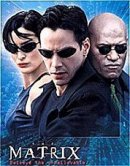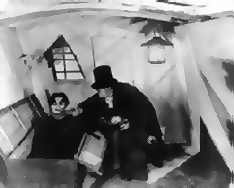
| Your Life
Is A Movie The Surveillance Culture as Entertainment by Nicholas Rombes |
|
Today,
a second-order reality threatens not to replace the Real, but to
expose it as a threat. The final threat. We have been prepared for
this by movies like eXinstenZ and The Matrix and Minority
Report, which have helped to transform fear into desire. "Big
Brother" is no longer a source of anxiety, but of fascination. The
Department of Defense's central research arm, the Defense Advanced
What does this have to do with movies? Everything, because movies today are fully engaged with exploring what they have always been about: surveillance. Hitchcock's voyeurism has evolved into extensive technologies of looking and tracking and archiving; the very kind of information management that makes DVDs so popular turns upon a fascination with the captured "in-between" moments of a film: the multiple takes, the discarded lines, the trimmed scenes. If these turn out to be more compelling than the actual movie itself, it is because we are not only tired, but wary of the Real itself that movies tempt us away from. In Vanilla Sky and eXistenZ and The Matrix, characters demand to know the truth because we don't want to. Doesn't some degree of our sadness, at the end of the day, come from our secret recognition that we are parting, more deeply than ever before, with what we used to call the Real? In
Minority Report, our futures are monitored from the present,
a threat that is strangely exciting on the big screen. We are nostalgic
for a world that does not yet quite exist. At last, the world of
movies outstrips the real world not by building a better one, but
by building a more real one. The loss of privacy -- the willingness to let ourselves be monitored -- is a form of virtual discipline we are willing to accept, because it is part of the cinematic logic of voyeurism that is ubiquitous. Voyeuristic desire is powerful; it is a desire that great films like De Palma's Blow Out and Coppola's The Conversation recognize, glamorizing it even as they warn against it. Yet the hazy paranoia of these movies -- their inherent distrust of the stories they were telling -- has finally proven too difficult today. For all the good and bad things that can be said about the film generation movies of the 1970s, their legacy might very well be that they served as warnings, or at least offered a level of creepy skepticism and paranoia that got audiences thinking about the potentially dangerous ways that the culture was unfolding. The bleak paranoia of George Lucas's THX 1138 renders it a less watchable movie than, say, Dark City, but that's in part because the paranoia, despair, nihilism, and even veiled political critique have become a beautiful commodity. It's not that Minority Report is any less subversive than THX 1138, but rather that subversion has become a genre in its own right; a relatively safe and marketable category. The Matrix can raise more wide-ranging, profound, and deeply disturbing issues than any movie of the 1970s, and yet it renders these serious topics too beautifully and glamorously to be shocking. Tom Cruise can worry aloud about government control in Minority Report, yet doesn't the movie secretly ask us to admire the vast machinery of surveillance and control, in the same way that Alien asked us to admire the creature? Movies like The Matrix and Minority Report (and even Spy Kids) aestheticize power even as their plots declaim against it; they prepare us for the coming Surveillance Culture by making it look beautiful and dangerous in an exotic way. And there is no escape from their world, because the cinematic vision has triumphed today, tentacled into every facet of popular culture. This may seem like a strange claim to make-have movies ever been separate from pop culture? -- but it's important to keep in mind how the divisions among various aspects of popular culture have eroded in recent years. While tie-ins or crossover marketing are nothing new, they have reached unprecedented levels in new media. To take one example: the video game version of Lord of the Rings: Two Towers, approximates the film in hyperrealistic ways that positively blur the lines between movie and game. One on-line reviewer, Louise Bedigian, describes the game this way: "Most of the levels begin with a scene taken directly from one of the films. . . . The thing that makes the movie scenes stand out is how they are blended with the real-time polygon game footage. One minute you're watching the actors battle an army of orcs, the next minute you're battling the orcs." Complete with the original music from the film, the actual actors' voices, and the participation of the director, Peter Jackson, the question becomes not "is the movie better than the game?" but rather "do you want to play the movie or watch it?" The dominant narrative of our society is cinematic: educators talk about how to make their classes more visual; the White House renders war cinematic (or at least videomatic); video games refashion and sometimes literally inject cinema into their games; cell phones play movies; flash animation renders the internet increasingly more fluid and motion-like. Cinema has spectacularly colonized nearly every pop cultural, political, and social space. Even academia-with its tradition of dissent and critique-is saturated with the cinematic vision. At M.I.T.'s Program in Comparative Media Studies, for example, there is a new project called "Games to Teach," described this way: "As part as Microsoft i-Campus, a five-year research alliance between MIT and Microsoft intends to explore best practices in game design and production and current educational theory." The description of the program goes on to say, "Henry Jenkins [Director of Comparative Media Studies] and his colleagues believe computer and video games are emerging as a powerful new teaching medium that enables robust interactivity, providing for new pedagogical models." Jenkins says that "The challenge of the Games-to-Teach Project will be to create science and engineering content in a compelling narrative form that students want to engage with." The
risk in saying this, I know, is that it sounds defensive, conservative,
maybe even Luddite. For who can deny the pure visual joy of our
cinematic landscape, the triumph of the camera eye? It was the dream
of the modernists, after all. Films like Vertov's Man with a
Movie Camera, or Wiene's Like the characters in David Cronenberg's eXistenZ, we find that we have been in the game all along. "Real life" is merely a staging point for deeper and deeper penetrations into the fake world that has become, in fact, our real one. The sweeping victory of cinematic vision -- from pop culture to education to politics -- is only the latest and most dangerous stage of our evolution out of the old reality and into the new. The promise of movies-ranging from Metropolis to Blade Runner, from Fight Club to Mulholland Drive -- has always been that they gave us the imaginative spaces to test out the alternate worlds they were projecting. But they always depended on the counterpoint of the real world as a basis for comparison, a kind of constant against their variables. Don't think you are spared. For your life, too, is a movie, a soundtrack for someone. You have been documented. Whose home movies are you in? Who watches you in your car at the intersection? Who has recorded your voice, saved your e-mails, archived your purchases? For someone, you are a prediction waiting to happen. You have been prepared for this all your life, watching movies in the dark, spying. The Orwellian future you learned to dismiss is here, and now you are waiting --eagerly perhaps -- to see the fangs.
-- Nicholas Rombes
Discuss
this article on the nextPix FORUM by going to its discussion
thread:
[click here] |

| |
 |
Euro Screen Writers Articles on Euro film, research, plus a great cache of interviews with such directors as Godard, Besson, Agnieszka Holland, Peter Greenway, and Fritz Lang. |
 |
Done Deal: A current list of the latest industry script sales. |
 |
UK's Film Unlimited Truly unlimited, one of the best film sites going. Plenty of news, reviews, special reports, features, and PREVIEWS. |
 |
Screen Writer's Utopia! What are they, who wrote them, who's doing them, and what you can expect. |
 Research
Projects Agency (
Research
Projects Agency ( Citizen-audiences
are willing to accept the fact that their lives are no longer private
not because they fear terrorism personally, nor because they believe
they can purchase their privacy like a commodity, but because they
have been prepared for this world by movies, which have accelerated,
glamorized, and naturalized these losses of individual freedom and
privacy. In this respect, Hollywood has done more than any President
or government agency ever could to erase the myth of the private
individual.
Citizen-audiences
are willing to accept the fact that their lives are no longer private
not because they fear terrorism personally, nor because they believe
they can purchase their privacy like a commodity, but because they
have been prepared for this world by movies, which have accelerated,
glamorized, and naturalized these losses of individual freedom and
privacy. In this respect, Hollywood has done more than any President
or government agency ever could to erase the myth of the private
individual.  Cabinet of Dr. Caligari, or Varda's Cleo from 5 to 7,
all projected a kind of jump-cut, cinematic state of mind, a life
based on motion and shifting perspectives. It seems that this should
be a good thing: cinema always has the potential to smash and rearrange
the old ways of seeing. Its perpetual assault on reality always
comes with the potential for radical change.
Cabinet of Dr. Caligari, or Varda's Cleo from 5 to 7,
all projected a kind of jump-cut, cinematic state of mind, a life
based on motion and shifting perspectives. It seems that this should
be a good thing: cinema always has the potential to smash and rearrange
the old ways of seeing. Its perpetual assault on reality always
comes with the potential for radical change.